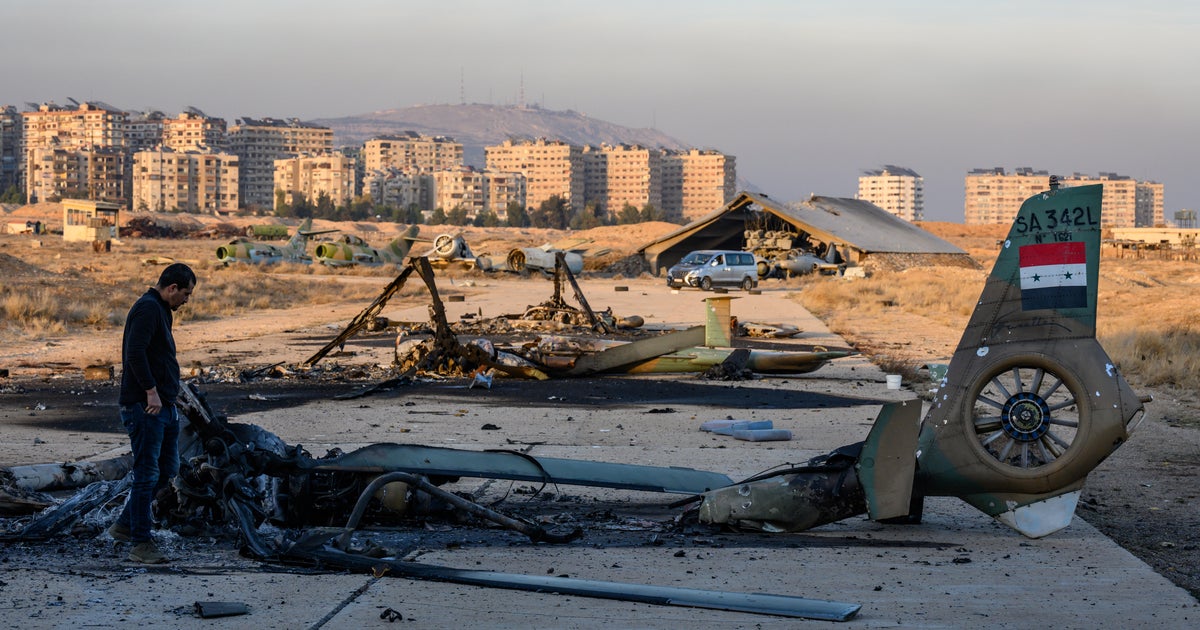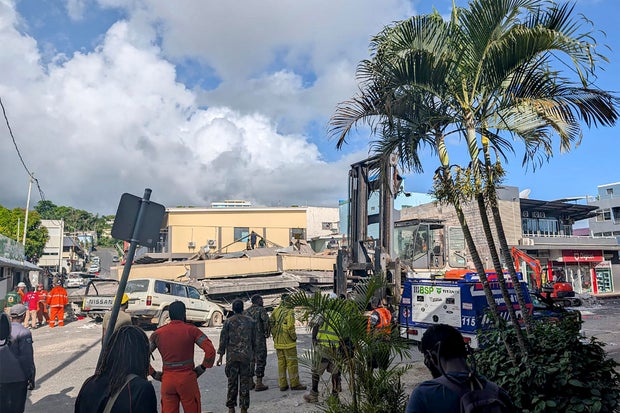CBS News
U.S. to Israel: Boost humanitarian aid to Gaza or risk losing weapons funding
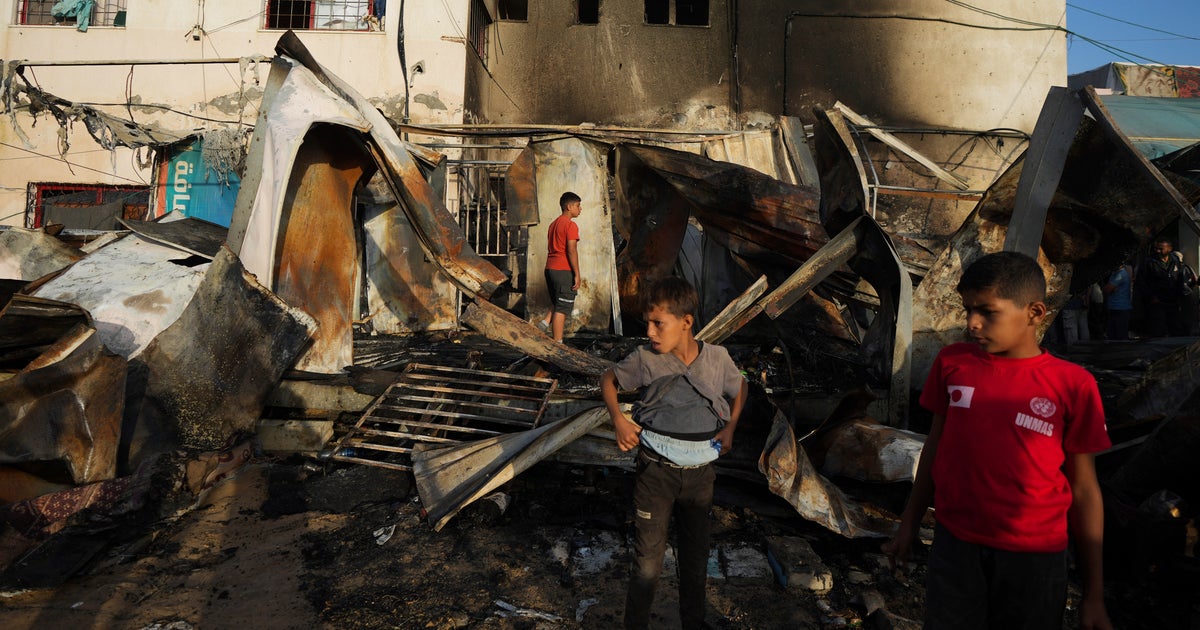
The Biden administration has warned Israel that it must increase the amount of humanitarian aid it is allowing into Gaza within the next 30 days or it could risk losing access to U.S. weapons funding.
Secretary of State Antony Blinken and Defense Secretary Lloyd Austin warned their Israeli counterparts in a letter dated Sunday that the changes must occur. The letter, which restates U.S. policy toward humanitarian aid and arms transfers, was sent amid deteriorating conditions in northern Gaza and an Israeli airstrike on a hospital tent site in central Gaza that killed at least four people and burned others.
A similar letter that Blinken sent to Israeli officials in April led to more humanitarian assistance getting to the Palestinian territory, State Department spokesman Matthew Miller said Tuesday. But that has not lasted.
“In fact, it’s fallen by over 50% from where it was at its peak,” Miller said at a briefing. Blinken and Austin “thought it was appropriate to make clear to the government of Israel that there are changes that they need to make again, to see that the level of assistance making it into Gaza comes back up from the very, very low levels that it is at today.”
For Israel to continue qualifying for foreign military financing, the level of aid getting into Gaza must increase to at least 350 trucks a day, Israel must institute additional humanitarian pauses and provide increased security for humanitarian sites, Austin and Blinken said in their letter. They said Israel had 30 days to respond to the requirements.
“The letter was not meant as a threat,” White House national security spokesman John Kirby told reporters. “The letter was simply meant to reiterate the sense of urgency we feel and the seriousness with which we feel it, about the need for an increase, a dramatic increase in humanitarian assistance.”
An Israeli official confirmed a letter had been delivered but did not discuss the contents. That official, speaking on condition of anonymity to discuss a diplomatic matter, confirmed the U.S. had raised “humanitarian concerns” and was putting pressure on Israel to speed up the flow of aid into Gaza.
The letter, which an Axios reporter posted a copy of online, was sent during a period of growing frustration in the administration that despite repeated and increasingly vocal requests to scale back offensive operations against Hamas, Israel’s bombardment has led to unnecessary civilian deaths and risks plunging the region into a much wider war.
“We are particularly concerned that recent actions by the Israeli government, including halting commercial imports, denying or impeding 90 percent of humanitarian movements” and other restrictions have kept aid from flowing, Blinken and Austin said.
The Biden administration is increasing its calls for its ally and biggest recipient of U.S. military aid to ease the humanitarian crisis in Gaza while assuring that America’s support for Israel is unwavering just before the U.S. presidential election in three weeks.
Funding for Israel has long carried weight in U.S. politics, and the president said this month that “no administration has helped Israel more than I have.”
Humanitarian aid groups fear that Israeli leaders may approve a plan to seal off humanitarian aid to northern Gaza in an attempt to starve out Hamas, which could trap hundreds of thousands of Palestinians who are unwilling or unable to leave their homes without food, water, medicine and fuel.
U.N. humanitarian officials said last week that aid entering Gaza is at its lowest level in months. The three hospitals operating minimally in northern Gaza are facing “dire shortages” of fuel, trauma supplies, medications and blood, and while meals are being delivered each day, food is dwindling, U.N. spokesman Stephane Dujarric said.
“There is barely any food left to distribute, and most bakeries will be forced to shut down again in just days without any additional fuel,” he said.
The U.N. humanitarian office reported that Israeli authorities facilitated just one of its 54 efforts to get to the north this month, Dujarric said. He said 85% of the requests were denied, with the rest impeded or canceled for logistical or security reasons.
COGAT, the Israeli body facilitating aid crossings into Gaza, denied that crossings to the north have been closed.
U.S. officials said the letter was sent to remind Israel of both its obligations under international humanitarian law and of the Biden administration’s legal obligation to ensure that the delivery of American humanitarian assistance should not be hindered, diverted or held up by a recipient of U.S. military aid.
Israel’s retaliatory offensive since the Oct. 7, 2023, attacks by Hamas has killed over 42,000 people in Gaza, according to the territory’s Health Ministry. It does not differentiate between fighters and civilians but has said a little more than half the dead are women and children. The Hamas attacks killed some 1,200 people in Israel, mostly civilians, and militants abducted another 250.
The United States has spent a record of at least $17.9 billion on military aid to Israel since the war in Gaza began and led to escalating conflict around the Middle East, according to a report for Brown University’s Costs of War project.
That aid has enabled Israel to purchase billions of dollars worth of munitions it has used in its operations against Hamas in Gaza and Hezbollah in Lebanon. However, many of those strikes also have killed civilians in both areas.
___
AP reporter Josef Federman in Jerusalem and Edith M. Lederer at the United Nations contributed.
CBS News
Head of Russia’s nuclear defense forces killed in Moscow blast triggered by device hidden in scooter, officials say

Moscow — The head of Russia’s Nuclear, Biological, and Chemical Defense Forces, Lt. General Igor Kirillov, was killed along with his deputy early Tuesday in an explosion in Moscow, Russia’s Investigative Committee said.
An explosive device hidden in an electronic scooter went off outside a residential building as the two men left the structure, Agence France-Presse cites investigators as saying.
ALEXANDER NEMENOV / AFP via Getty Images
“Investigators, forensic experts and operational services are working at the scene,” committee spokesperson Svetlana Petrenko said in a statement. “Investigative and search activities are being carried out to establish all the circumstances around this crime.”
ALEXANDER NEMENOV / AFP via Getty Images
The committee carries out responsible major investigations in Russia.
Kirillov was sentenced in absentia by a Ukrainian court on Dec. 16 for the use of banned chemical weapons in Ukraine during Russia’s military operation in Ukraine that started in Feb. 2022.
AFPTV / AFP via Getty Images
Ukraine’s Security Service, the SBU, said it had recorded more than 4,800 uses of chemical weapons on the battlefield since February 2022, particularly K-1 combat grenades.
During the almost 3-year operation, Russia has made small but steady territorial gains to the nearly one-fifth of Ukraine it already controls.
Kirillov had been in his post since 2017, AFP notes.
CBS News
Earthquake rocks Pacific island nation of Vanuatu, deaths feared, U.S. embassy damaged
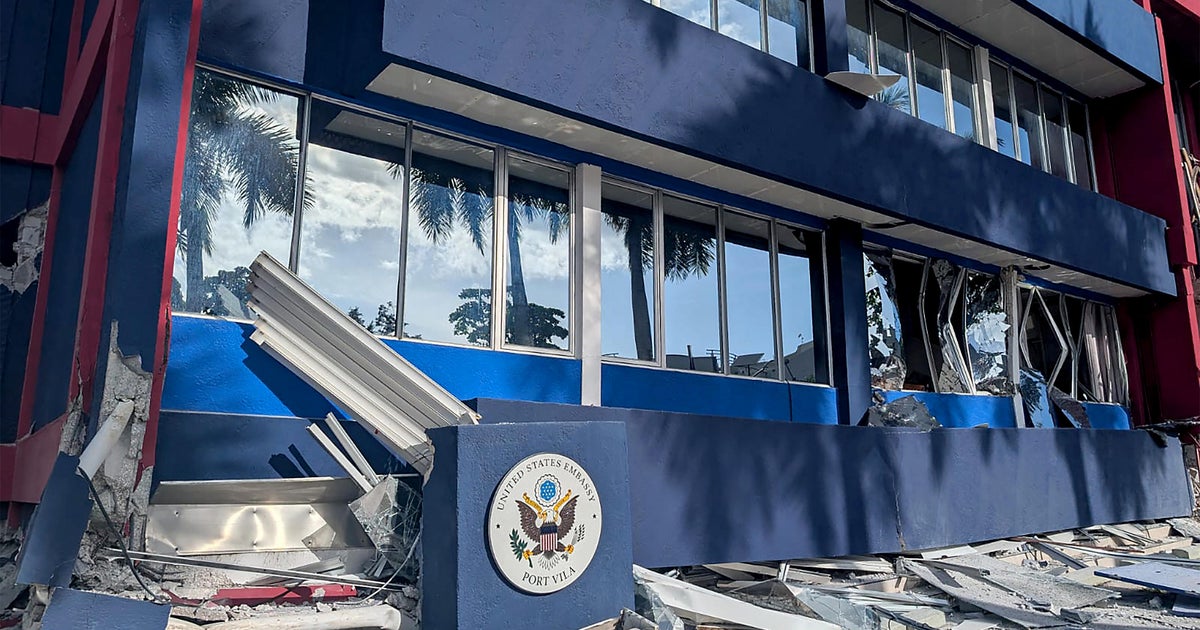
A powerful earthquake hit the Pacific island nation of Vanuatu Tuesday, smashing buildings in the capital, Port Vila, including one housing the embassies of the U.S. and other nations. A witness told Agence France-Presse of bodies seen in the city.
Dan McGarry, a journalist with the Organized Crime and Corruption Reporting Project based in Vanuatu, told the Reuters news agency in an interview that police said at least one person had been killed and injured people had been taken to hospital.
“It was the most violent earthquake I’ve experienced in my 21 years living in Vanuatu and in the Pacific Islands. I’ve seen a lot of large earthquakes, never one like this,” he said.
The 7.3-magnitude quake struck at a depth of 35 miles, off the coast of Efate, Vanuatu’s main island, at 12:47 p.m. local time, according to the U.S. Geological Survey.
The ground floor of a building housing the U.S, French and other embassies had been crushed under higher floors, resident Michael Thompson told AFP by satellite phone after posting images of the destruction on social media.
“That no longer exists. It is just completely flat. The top three floors are still holding but they have dropped,” Thompson said.
“If there was anyone in there at the time, then they’re gone.”
Thompson said the ground floor housed the U.S. embassy, but that couldn’t be immediately confirmed.
A photo showed significant damage to the building:
STR / AFP via Getty Images
The United States has closed the embassy until further notice, citing “considerable damage” to the mission, the U.S. embassy in Papua New Guinea said in a message on social media. “Our thoughts are with everyone affected by this earthquake,” the embassy said.
The New Zealand High Commission, housed in the same building, suffered “significant damage,” a statement from Foreign Minister Winston Peters’ office said, adding that, “New Zealand is deeply concerned about the significant earthquake in Vanuatu, and the damage it has caused.”
Thompson, who runs a zipline adventure business in Vanuatu, said, “There’s people in the buildings in town. There were bodies there when we walked past.”
A landslide on one road had covered a bus, he said, “so there’s obviously some deaths there.”
The quake also collapsed at least two bridges, and most mobile networks were cut off, Thompson said.
“They’re just cracking on with a rescue operation. The support we need from overseas is medical evacuation and skilled rescue, (the) kind(s) of people that can operate in earthquakes,” he said.
STR / AFP via Getty Images
Video footage posted by Thompson and verified by AFP showed uniformed rescuers and emergency vehicles working on a building where an external roof had collapsed onto a number of parked cars and trucks.
The streets of the city were strewn with broken glass and other debris from damaged buildings, the footage showed.
Nibhay Nand, a Sydney-based pharmacist with businesses across the South Pacific, said he had spoken to staff in Port Vila who said most of the store there had been “destroyed” and that other buildings nearby had “collapsed.”
“We are waiting for everyone to get online to know how devastating and traumatic this will be,” Nand told AFP.
A tsunami warning was issued after the quake, with waves of up to three feet forecast for some areas of Vanuatu, but it was soon lifted by the Pacific Tsunami Warning Center.
Earthquakes are common in Vanuatu, a low-lying archipelago of 320,000 people that straddles the seismic Ring of Fire, an arc of intense tectonic activity that stretches through Southeast Asia and across the Pacific Basin.
Vanuatu is ranked as one of the countries most susceptible to natural disasters such as earthquakes, storm damage, flooding and tsunamis, according to the annual World Risk Report.
CBS News
12/16: CBS Evening News – CBS News
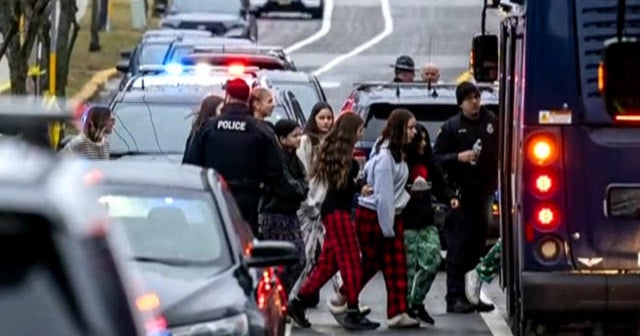
Watch CBS News
Be the first to know
Get browser notifications for breaking news, live events, and exclusive reporting.




